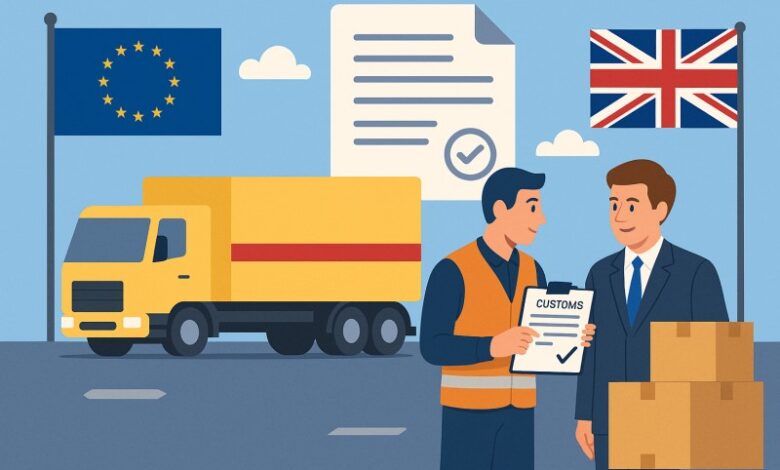How UK Businesses Can Streamline Imports from the EU

Since Brexit, importing goods from the EU has become trickier for UK businesses. New rules, paperwork, and customs checks have added layers of complexity to what used to be a straightforward process. For companies of all sizes looking to bring goods into the UK, finding ways to keep things smooth and cost-effective is a top priority. One practical solution is teaming up with freight forwarders. These logistics experts can handle both the transport and the paperwork, saving you time, money, and headaches. Here’s how UK businesses can make EU imports easier, with a focus on working with professionals to get the job done.
Why Imports from the EU Are More Complicated Now
Before Brexit, goods moved freely between the UK and EU with no customs barriers. That’s all changed. Now, businesses need to deal with customs declarations, tariffs (depending on the goods), and extra documentation like proof of origin. You’ll also need an EORI number to clear customs. Without it, your shipments won’t even get off the ground. On top of that, delays at borders can throw a spanner in the works if paperwork isn’t spot on. For businesses importing anything from machinery parts to electronics, these hurdles can eat into profits and slow down operations.
Take freight from the UK to Germany, for example. What used to be a straightforward process now involves multiple forms, detailed invoices, and compliance with both UK export and EU import regulations. If even one detail is wrong, your shipment could be held at customs, causing delays and potentially extra fees. For businesses importing anything from machinery parts to electronics, these hurdles can eat into profits and slow down operations.
This is where freight forwarders come in. They’re specialists who take the stress out of moving goods across borders, handling everything from transport to customs clearance. For UK businesses importing from Europe, partnering with one can make a real difference.
The Benefits of Using Freight Forwarders
Freight forwarders act as a one-stop shop for logistics. When importing from the EU, they can arrange road freight, the main method for UK-EU trade. Whether you’re moving a full truck load (FTL) or smaller batches through groupage (where your goods share space with others), they’ll sort out the transport details. This means you don’t have to coordinate with multiple hauliers or worry about finding the best route.
Beyond transport, freight forwarders tackle the paperwork. Customs declarations can be a minefield. Get one detail wrong, and your goods could be stuck at the border. A good forwarder will ensure everything’s filled out correctly and submitted on time. They’ll also advise on things like VAT, tariffs, and any special requirements for your goods. For businesses new to importing or those scaling up, this all-in-one service can prevent costly mistakes.
Price is another big plus. Freight forwarders often have established relationships with carriers, which can mean better rates than you’d get going solo. They can also bundle services, freight and customs together, so you’re not paying separate fees to different providers. Plus, their experience means they know how to avoid delays that rack up extra costs.
They can also help with third-party logistics (3PL) when exporting from the UK to the EU, managing warehousing, inventory, and distribution as part of a complete supply chain solution. This is particularly useful for businesses looking to expand their reach into Europe without having to invest in physical infrastructure on the continent.
How to Choose the Right Freight Forwarder
Not all freight forwarders are the same, so it’s worth picking one that fits your needs. Look for a company with a strong track record in UK-EU trade. Check if they offer groupage for smaller shipments or FTL for bigger loads, flexibility matters. It’s also a good idea to ask about their customs clearance process. Some work with trusted partners to handle this, which is fine as long as it’s seamless for you.
A friendly, helpful team is a bonus. Importing can throw up unexpected issues, say a hold-up at Dover or a missing document, and you’ll want someone on the other end who’s easy to talk to and quick to sort things out. Membership in a body like the British International Freight Association (BIFA) is a solid sign of professionalism and reliability too.
For extra peace of mind, see if they provide insurance options. The UK government’s guide to importing highlights how things can go wrong, such as lost goods, delays, or damage, so it’s worth covering your bases.
Saving Time and Money in the Long Run
Teaming up with a freight forwarder isn’t just about fixing today’s problems, it’s about setting your business up for the future. Once they know your import patterns, they can fine-tune the process, cutting delays and costs over time. You’ll spend less time chasing paperwork or sorting out logistics and more time growing your business. And with borders only getting busier, having a pro in your corner keeps you ahead of the curve.
Importing from the EU doesn’t have to be a slog. By working with freight forwarders, UK businesses can turn a complicated process into a smooth one. From handling road freight to tackling customs, they take the weight off your shoulders, leaving you free to focus on what you do best.

